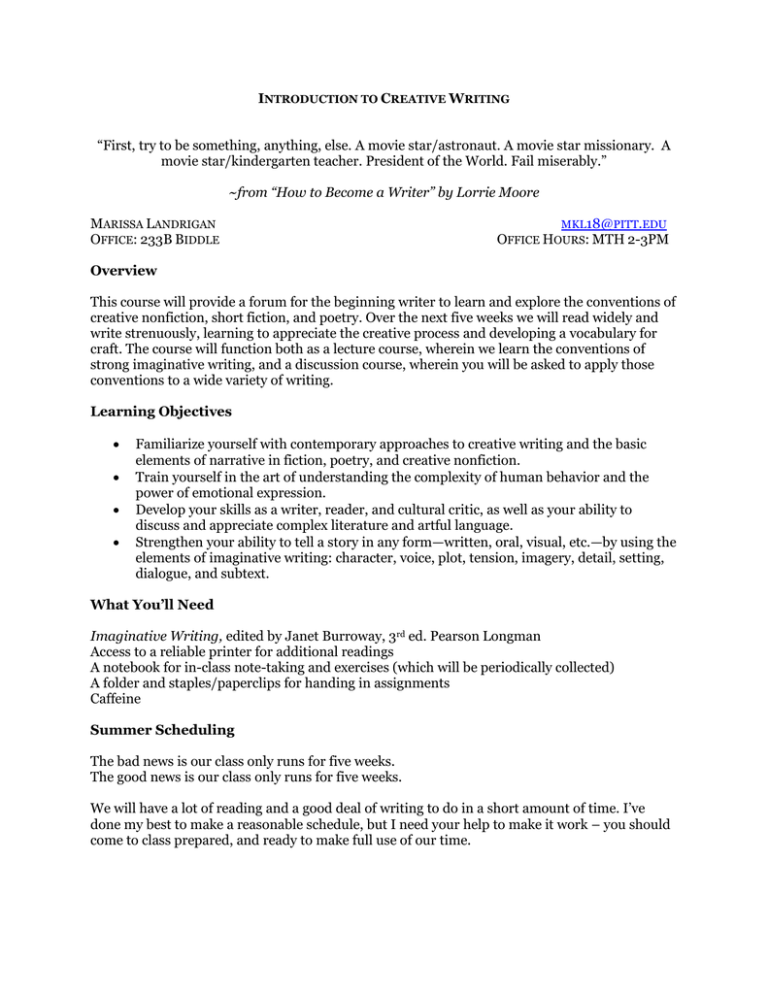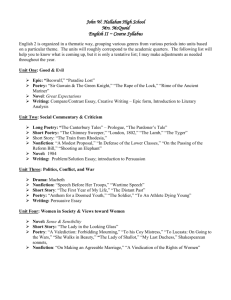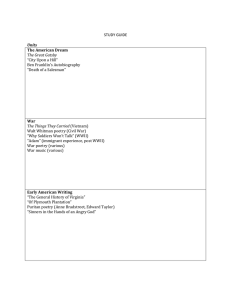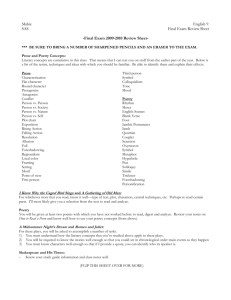
INTRODUCTION TO CREATIVE WRITING
“First, try to be something, anything, else. A movie star/astronaut. A movie star missionary. A
movie star/kindergarten teacher. President of the World. Fail miserably.”
~from “How to Become a Writer” by Lorrie Moore
MARISSA LANDRIGAN
OFFICE: 233B BIDDLE
MKL18@PITT.EDU
OFFICE HOURS: MTH 2-3PM
Overview
This course will provide a forum for the beginning writer to learn and explore the conventions of
creative nonfiction, short fiction, and poetry. Over the next five weeks we will read widely and
write strenuously, learning to appreciate the creative process and developing a vocabulary for
craft. The course will function both as a lecture course, wherein we learn the conventions of
strong imaginative writing, and a discussion course, wherein you will be asked to apply those
conventions to a wide variety of writing.
Learning Objectives
Familiarize yourself with contemporary approaches to creative writing and the basic
elements of narrative in fiction, poetry, and creative nonfiction.
Train yourself in the art of understanding the complexity of human behavior and the
power of emotional expression.
Develop your skills as a writer, reader, and cultural critic, as well as your ability to
discuss and appreciate complex literature and artful language.
Strengthen your ability to tell a story in any form—written, oral, visual, etc.—by using the
elements of imaginative writing: character, voice, plot, tension, imagery, detail, setting,
dialogue, and subtext.
What You’ll Need
Imaginative Writing, edited by Janet Burroway, 3rd ed. Pearson Longman
Access to a reliable printer for additional readings
A notebook for in-class note-taking and exercises (which will be periodically collected)
A folder and staples/paperclips for handing in assignments
Caffeine
Summer Scheduling
The bad news is our class only runs for five weeks.
The good news is our class only runs for five weeks.
We will have a lot of reading and a good deal of writing to do in a short amount of time. I’ve
done my best to make a reasonable schedule, but I need your help to make it work – you should
come to class prepared, and ready to make full use of our time.
Assignments
Your grade in this class will be determined by a combination of your own original writing, a
critical final exam, and your active participation in reading and discussion throughout the
semester, like so:
Exercise portfolio (10%): We will write in the classroom two or three times per week. At
several points, I will collect your notebook so you all receive credit for actively
participating in these exercises.
Quizzes (15%): Reading comprehension. Making connections between creative work and
critical concepts. The usual.
Original essay (15%)
Packet of 5 original poems (15%)
Original short story (15%)
Final critical exam (30%)
The rules for success in this course are simple:
1. Attend classes. We don’t read texts and then regurgitate them in a Powerpoint
presentation here. The process of learning critical analysis and creative technique will
happen in the classroom. In addition to hurting your final grade, missing class also
jeopardizes your ability to perform well on assignments. If you are absent, it is your
responsibility to consult the syllabus and your classmates to find out what you may have
missed and to catch up. Finally, if you’re here – BE HERE. I will turn off my cell phone
when lecturing, and I expect you to do the same. If I see you texting, surfing the web,
listening to music, fly-fishing, blow-drying your hair, etc. in class, I will mark you as absent.
(And yes, I know when you’re texting – no one just looks down at their crotch and
smiles.)
2. Listen and talk. I try to structure class so it is student centered rather than teacher
centered. In a teacher-centered classroom, the instructor lectures or leads discussions
and the students listen, take notes, and respond to questions. In a student-centered
classroom, students play a more active role: they initiate discussion, work
collaboratively, and may even help set course goals. The rationale for this approach is
that students learn best when they are active participants. You learn to write and critique
effectively by working at those activities, not by listening to lectures. Our class time will
be devoted to discussions, writing exercises, small group collaboration, and writing
workshops. You should come to class ready to contribute.
3. Do the work. Not completing all major assignments results in an automatic failure of
the class. Late assignments will be penalized at one letter grade per day late. If you have
any extenuating circumstances that will conflict with the deadlines for these major
assignments, you must speak with Marissa in advance of the conflict to make other
arrangements.
4. Challenge yourself. In-depth critical reading, thoughtful commentary and ambitious
creative works are so much more captivating than safe, easy ones. Stretch yourself and
I’ll be impressed, even if you don’t always pull it off.
Computer access to course materials
Any of our course materials not included in the class textbook will be distributed in electronic
form rather than on paper. This conserves the energy and quality of our copier in the Writing
Program. I expect that ALL readings and assignment prompts will be printed and brought to
class for discussion and analysis on the day they are due. Even if you are having problems with
your own computer, I still expect you to keep up with the work in our course by using a machine
in one of the many computer labs on campus. Over the course of the semester, you will need to
use files encoded in the following formats: HTML, PDF, and MSWord. It is possible that you
may have difficulties with one or more of these file formats due to the particular characteristics
of your own computer hardware or software; thus, you may have to use public computers on
campus to access files that your own computer can’t read.
Office Hours
I encourage you to come to me with specific questions about your papers at any stage of the
writing process, and I will schedule special appointments if my regular hours conflict with your
other commitments. Office visits are opportunities for one-on-one instruction; they are not
editing sessions where I merely correct your work. Consequently, I have established the
following guidelines for office hours:
Whenever you want to work with me on a draft, it is helpful if you bring two copies. It is hard for
us to work efficiently huddled over a single copy. Any handwritten changes to your own draft
should be made by you. I will not serve as your proofreader. I don't believe you will learn
anything from having me merely edit your work. Do not come to my office and ask me to look
over a paper "in general." If I am to help you develop as a writer, you must come to me with
specific questions, and you must learn to recognize the areas in which you need help.
Asking me for help on a piece does not guarantee that you will receive a high grade. Use my
advice along with your own knowledge and skill to revise and edit carefully. I will help you, but
you are ultimately responsible for the quality of your work.
Classroom Respect & Coursework Ethics
Imaginative writing is a form of art, not an excuse to shock people. Dark subjects and taboo
topics are par for the course in the world of artistic exploration; we will certainly read “dark”
and/or “edgy” published work in class and you may choose subject matters that deal with sex,
drugs, and rock and roll. Foul language is fine if it is in the context of the story and consistent
with the character’s way of speaking. However, I do not accept essays or exercises that rely on
excessive shock value: inappropriately graphic violence, blatant pornography, and/or hate
speech masquerading as art are not acceptable. Students whose creative work is deemed to be a
direct or indirect threat to other students or instructors will be dropped from the class.
In addition, a creative writing class is a chance for you to showcase your brilliant originality, the
depth of your own experience and your emotional truths. So, plagiarism, aside from being a
poor choice academically, is a waste of everyone’s time. Such work will be dealt with in
accordance with university policy.
UPJ does not discriminate on the basis of race, color, age, religion, national origin, sexual
orientation, sex, marital status, or disability. An effective learning environment values and
supports diversity. Our classroom should be a place of lively discussion and all opinions are
welcome. Intolerance and hateful statements of any kind are not welcome, and anyone making
the classroom environment uncomfortable for shared learning will be asked to leave.
Course Schedule
Please note this schedule is tentative and subject to change.
Week
1
Day
6 – May
7
9
10
2
13
14
16
17
3
20
21
23
In-Class
Class overview
On Keeping a Notebook
Introduction to Detail
Image and Setting
Bartlemae’s “The School”
Poetry: Komunyaaka, Alexie,
Appleman
Voice and Character
Poetry: Ginsberg, Kooser,
Jennings
Story
The Genres
Poetry: Goldbarth, Lee
Creative Nonfiction -Personal Memory
Bass “Jan. 13”
CNF –
On Abstraction
Danticat “A Little While”
CNF –
The Individual in the World
Terkel “Jack Culberg, 76”
Essays Due
Introduce Poetry Unit
Poetry –
Concrete Detail and Image
Collins “Snow Day”
Poetry –
Lists and
Line breaks
Poetry –
Common objects as metaphors
Poetry Packet Due
Introduce Fiction Unit
24 Wolff “Bullet in the Brain”
To-Do for Today
Read Dillard “Heaven and Earth in Jest,”
Didion “At the Dam,” and pg. 134-44 (IW)
Read Dybek “Thread,” Munro “Prue,” p.
47-60 and p. 87-101 (IW)
Read Hampl “Red Sky at Morning,” Foster
Wallace “Incarnations of Burned
Children,” and p. 168-176 (IW)
Read Beard “Out There”
Read Atwood “The Female Body” (IW)
Read Lethem “13, 1977, 21”
Essay DUE
Read Oliver “Wild Geese,” Kumin
“Magellan Street, 1974,” Wright “A
Blessing”
Read Komunyaaka “Facing It,” Stern
“Columbia in Gem,” and Bonair-Agard,
“American History looks for light—“ (IW)
Read Sextion “Welcome Morning,” Carver
“Happiness,” and Updike “Perfection
Wasted”
Poetry Packet DUE
4
27
28
30
31
5
3 – June
4
6
7
Short Story –
Johnson “Car Crash While
Hitchiking”
Unlikeable characters
SS –
Hemingway “A Very Short
Story”
Opening lines
SS –
Scene v. summary
The real first event
Carlson “Bigfoot Stole My Wife”
Short Story Due
Creative Nonfiction & the
Elements of Craft Review
Short Story & the Elements of
Craft Review
Poetry & the Elements of Craft
Review
Final Exam review and
questions
Final Exam
Read Packer “Brownies”
Read Lahiri “A Temporary Matter”
Read O’Brien “The Things They Carried”
Short Story DUE
Read Walker “Beauty: When the Other
Dancer is the Self” (IW)
Read Gordimer “The Diamond Mine” (IW)
Read Roethke “I Knew a Woman” (IW)





